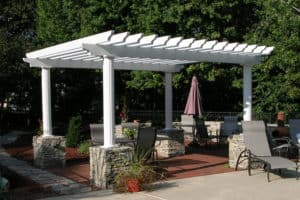 Pergolas are an affordable way to improve the look and enjoyment of your backyard, which makes them a popular choice among Dane County homeowners.
Pergolas are an affordable way to improve the look and enjoyment of your backyard, which makes them a popular choice among Dane County homeowners.
In this article, we’re going to look at two different pergolas materials — cedarwood and aluminum — to help you determine which option is your best choice. That said, it’s important to note that there is no one right choice for everybody. Budget, aesthetic and other project details, like the actual size of the pergolas being built, are all factors in the decision-making project.
Let’s Begin with Cost
Cedarwood pergolas typically cost less than aluminum pergolas, which can be a benefit IF you are willing to perform the necessary maintenance. As you’ll see, aluminum pergolas are practically maintenance free, lowering your time investment to keep them in excellent shape. Our customers overwhelmingly prefer maintenance-free aluminum pergolas, which is why it’s the only pergolas product we offer.
That said, let’s dive into some of the characteristics of these two pergolas materials, as well as the pros and cons of each.
Aluminum Pergolas
Sturdy and stable, aluminum pergolas tend to have a more modern, elegant look as compared to cedar pergolas. They’re also highly customizable and include a nice range of color options, textured coating options, as well as a wide variety of accessories — all of which contribute to your pergolas looking just right, so it perfectly complements the aesthetic of your home.
Maintenance free, and long lasting, aluminum pergolas stand the test of time, and Wisconsin weather for years of enjoyment. This is accomplished, in part, by powder coating the paint on the aluminum, which is a process that makes the paint job durable and resilient.
In addition, the Elitewood™ aluminum pergolas we build are coated with a multi-layer finish that repels dirt, controls fading and gives a hard, scratch-resistant finish that will look new for years. They have a wood grain, embossed finish for that authentic wood look.
An aluminum pergola also holds its shape and dimensions better than a cedar pergola, which can warp, crack or bow over time.
If you want the beauty of a pergola with a more modern feel — without the need for maintenance — then an aluminum pergola is an excellent choice.
Cedarwood Pergolas
When it comes to wood pergolas, we’re going to focus only on cedarwood. Yes, there are other wood options, including pressure-treated wood, tropical hardwood and modified wood, but for our purposes here we’re going to stick with cedar since it’s a material that best balances cost and durability, making it well suited for an outdoor environment.
Note: Western red cedar is a common type of cedar used for pergolas, and redwood is also popular. We mention this because these two types of wood are often considered the “same.” Although there are aesthetic differences between the two, both are naturally rot-resistant, insect-resistant and durable.
From an aesthetic point of view, cedar (or redwood) pergolas are going to provide a more rustic, natural look.
Unlike aluminum pergolas, cedarwood pergolas require regular maintenance. This is an important factor to keep in mind when choosing your pergolas material.
It’s also important to note that, compared to aluminum, cedar pergolas are better suited for large areas as the wood can span longer distances than aluminum without any structural compromise.
If you prefer a more rustic feel, a lower price tag, and don’t mind performing maintenance, a cedarwood pergola is an excellent choice.
Want to learn more?
Feel free to check out our pergolas overview page. You can also contact us anytime with questions or to set up an appointment to discuss things further!